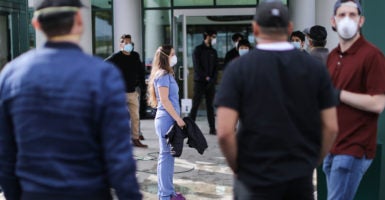The National Coronavirus Recovery Commission announced a five-phase plan to get the American economy and public health “back to normal” after the COVID-19 pandemic.
The 17-member commission established by The Heritage Foundation had its first formal and virtual meeting Thursday.
“Americans want to ensure their families are kept safe and healthy,” said commission Chairwoman Kay C. James, president of The Heritage Foundation.
The five phases outlined by the commission are:
—Return to a more normal level of business activity at the regional level based on scientific data.
—Slow the spread of the coronavirus while expanding testing, reporting, and contact tracing.
—Continue to build the science.
—Establish U.S. leadership in leading the free world in economic recovery.
—Reduce future risks of pandemics.
“The commission agrees that it is critically important to build the American people’s confidence that we can safely return to some semblance of normal soon,” James said, adding:
The way to build that confidence is to adopt a phased approach that mitigates the spread of the coronavirus, vastly improves testing, expands our capabilities to quickly find treatments and possibly a cure, and then allows Americans to gradually return to work. We must also look at ways to ensure we are better prepared to confront future pandemics.
For the first phase, Americans’ gradual return to the workplace would be done only after stabilizing the health care system; establishing enhanced testing, reporting, and contact tracing; and continuing to follow guidelines on mitigation from the Centers for Disease Control and Prevention.
During a conference call Wednesday with reporters, Dr. Bill Frist, a physician and former Senate majority leader who is on the commission, said the return to former work habits and places would be “community by community, not state by state.”
Slowing the spread, the second phase, is achieved by following the guidelines for hand-washing, social distancing, and other precautions set by the Trump administration’s Centers for Disease Control and Prevention.
The third phase would increase and expedite the availability of new diagnostic tests while supporting acceleration of proven therapeutics and vaccines.
The fourth, establishing U.S. leadership, will involve implementing “risk-informed measures to reestablish international travel while limiting threat of reinfection,” according to the commission.
The commission also suggests partnering with key strategic allies, including Western Europe and the Indo-Pacific, empowering economic freedom and partnerships in free markets.
The National Coronavirus Recovery Commission proposes to reduce future risks of pandemics by investing in national and state stockpiles, reforming supply chains, developing the supply of antiviral agents, seeking to develop vaccines for coronaviruses, and investing in an international biosurveillance network to detect and contain emerging infectious diseases through coordination and cooperation.
The commission, which is set to meet again April 20, is accepting suggestions from the public at CoronavirusCommission.com.
The Heritage Foundation established the commission—which includes experts from government, public health, disaster response and relief, academia and education, business, and the faith community—to provide policymakers and the public with recommendations on steps needed to move prudently toward recovery from the pandemic.
The Daily Signal is Heritage’s multimedia news organization.
































One Reply to “Coronavirus Commission Offers 5-Phase Plan for Getting America Back to Normal”